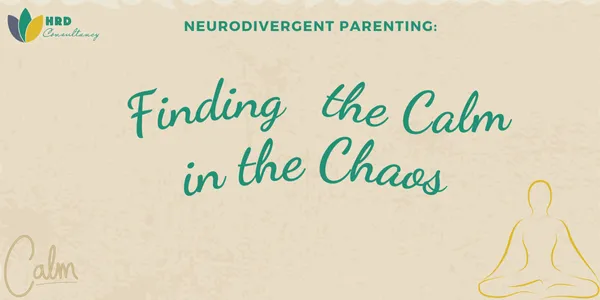
Finding calm in the chaos
Finding Calm in the Chaos: Mindfulness for Parents of Neurodivergent Children
Parenting is challenging under the best circumstances, but for those raising neurodivergent children, the journey can be particularly intense. The daily navigation of meltdowns, sensory sensitivities, and societal misunderstandings can leave parents feeling overwhelmed and depleted.
In our recent Thriving Thursdays session, we explored how mindfulness practices can serve as a powerful anchor for parents facing these unique challenges. Here's what we discovered about bringing mindfulness into the parenting journey.
The Power of Presence in Challenging Moments
When your child is experiencing dysregulation, your automatic response might be frustration or anxiety. Mindfulness offers an alternative path – the ability to pause, breathe, and respond rather than react. This slight shift can make a profound difference in how challenging situations unfold.
Remember: Neurodivergent children are often highly attuned to their parents' emotional states. When you can maintain calm during storms, you become a grounding presence for your child. Your regulated state helps them find their way back to regulation too.
Simple Mindfulness Practices for Busy Parents
Mindfulness doesn't require hours of meditation or a perfect environment. Even in the midst of chaos, these simple practices can help:
Box Breathing: Before responding to a challenging behavior, take four counts to inhale, hold for four counts, exhale for four counts, and pause for four counts.
The STOP Method: Stop, Take a breath, Observe what's happening internally and externally, and then Proceed with intention.
Sensory Grounding: When overwhelmed, notice five things you can see, four things you can touch, three things you can hear, two things you can smell, and one thing you can taste.
Self-Compassion: The Missing Ingredient
Parents of neurodivergent children often hold themselves to impossible standards. Mindfulness encourages self-compassion – the recognition that you're doing the best you can with the resources you have in each moment.
When you feel self-criticism rising, try placing a hand on your heart and offering yourself the same kindness you would extend to a good friend. Remind yourself: "This is difficult, and I'm doing my best. I'm not alone in this struggle."
Preventing Burnout Through Mindful Moments
Many parents operate in perpetual "survival mode," leading to chronic stress and eventual burnout. Mindfulness helps shift your nervous system out of fight-or-flight responses by creating small moments of rest throughout the day.
Even sixty seconds of mindful breathing while waiting for water to boil or sitting in your car before entering the house can provide valuable recovery time for your nervous system.
Moving Forward with Mindfulness
The path of parenting neurodivergent children is not linear. There will be challenging days and moments of profound connection. Mindfulness offers a way to be present for all of it – the difficulties and the joys.
If you're interested in deepening your mindfulness practice, consider joining our monthly mindfulness sessions or our comprehensive Nurture to Thrive program designed specifically for parents of neurodivergent children.
Remember that building a mindfulness practice is itself an exercise in self-compassion. Start small, celebrate your efforts, and trust that even brief moments of presence can ripple outward to benefit both you and your child.
This blog post was inspired by our recent Thriving Thursdays session. For more information about upcoming events or to access the replay of this session, please check out the Link in Bio page here.
